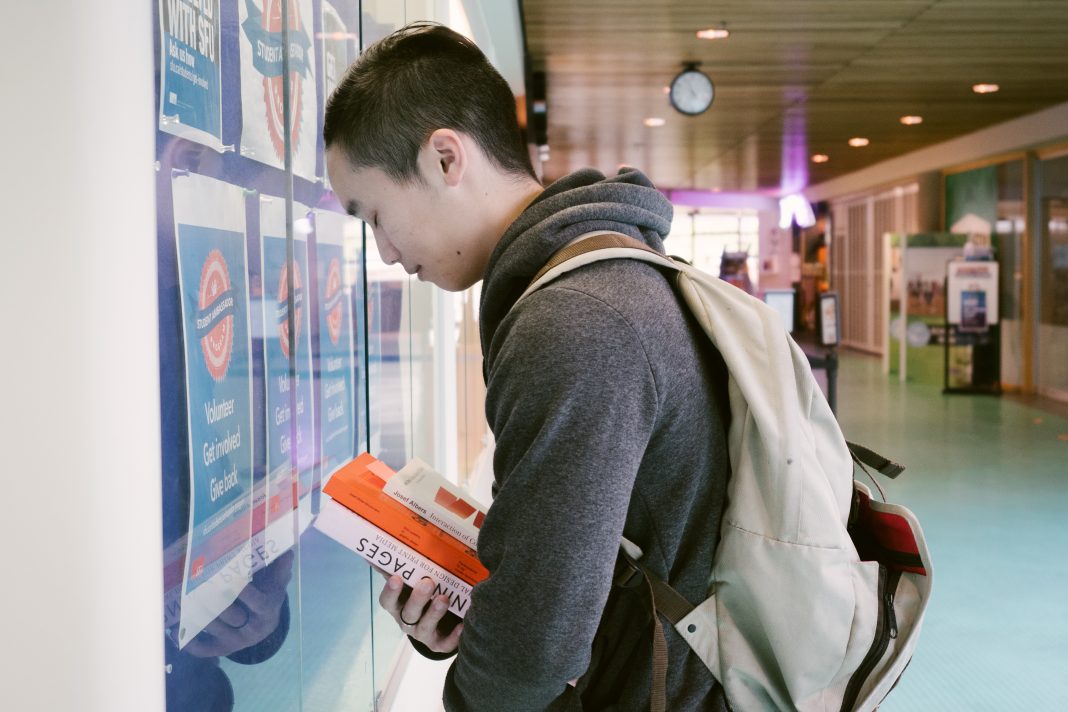By: Srijani Datta, Assistant News Editor
Student Senators Larissa Chen and Marco Zen gave a presentation titled “Mental Health at Simon Fraser University” to members of SFU Senate at the May 22 meeting.
The presentation focused on the “unprecedented demand for campus mental health (MH) services & support in Canadian Post-Secondary Institutions (PSIs).” Based on the findings from the 2016 National College Health Assessment report (NCHA), 2017 SFU Undergraduate Preliminary report, and the 2018 Student Health Advisory Committee report (in progress), Chen and Zenone pointed out that the 2015 and 2017 Undergrad Student Surveys showed a 2% decline (from 58% to 56%) in self-reported rates of “thriving as a university student”.
While they highlighted the benefits of the upcoming keep.meSAFE Student Support Program (SSP), a 24/7 clinical support service for all SFU students to be launched on August 1 2018, Chen and Zenone stressed that “there’s more work to be done.”
Using statistics from the NCHA report findings, Chen and Zenone pointed out that “academics (course policies) significantly influence mental health and wellness.” The presentation emphasized the need to “promote mental health and wellness while preserving academic integrity.” To this end, Chen and Zenone presented some suggestions prompted from students, including student opinions about “limiting use of timed exams in 50-minute classes,” and offering “flexibility in exams.” Ideas for creating more flexible exams included providing more options in questions, such as presenting seven possible questions and only requiring the completion of five, or taking more exams in a course and only counting the highest subset of marks out of all the exams.
Chen and Zenone then suggested some potential actions the university could take to create an academic environment more conducive to students’ mental health. One of the recommendations focused on the usefulness of “collaborative involvement and contributions of students, mental health groups [referring to the Student Health Advisory Committee], faculty & department members, service providers [referring to Health and Counselling Services], SFU administration champions, etc.”
Following the presentation, the Senate floor was opened up for discussion. The floor discussed if there were any specific policies or processes which led to “undue stress through the policy itself or through the communication of the policy.”
Senator Daniel Leznoff opined that, in his experience, “scheduling of courses and exams” have proved to be significant sources of stress for students, even though it is “not directly related to the academic performance of a student.”
Acknowledging that “sometimes we do things that we do not realize,” Senator Aoife Mac Namara brought up the ratio of the number of credits to workload. Describing the process as “content-creep or work-creep,” Senator Mac Namara explained that “sometimes a combination of courses worth 15 credits can give the student a workload of 20 credits or more to work with. This can cause significant stress to students and it is time we reviewed the processes behind it.”
When asked about her takeaway from the discussion, Larissa Chen stated, “given the variety of constructive feedback we received at SFU Senate today, I feel immensely proud to be an SFU student surrounded by such brilliant educators who are keen for proactive ways to support students’ academic success and mental wellbeing.”
Chen highlighted the need to “co-create solutions,” and continued by saying that “as student leaders, it’s important for us to advocate for such areas of improvement on a proactive and institutional level so we can fill the gap between data and action — but we must do so collaboratively. In consulting multiple stakeholders, we can identify gaps and uncover insights and missing narratives.”




